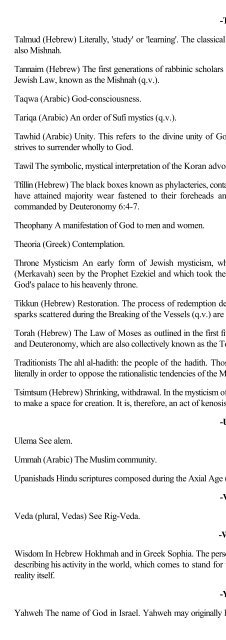Karen Armstrong - A History of God--The 4,000-Year Quest of Judaism, Christianity and Islam
You also want an ePaper? Increase the reach of your titles
YUMPU automatically turns print PDFs into web optimized ePapers that Google loves.
199<br />
Talmud (Hebrew) Literally, 'study' or 'learning'. <strong>The</strong> classical rabbinic discussions <strong>of</strong> the ancient code <strong>of</strong> Jewish Law. See<br />
also Mishnah.<br />
Tannaim (Hebrew) <strong>The</strong> first generations <strong>of</strong> rabbinic scholars <strong>and</strong> legists who collated <strong>and</strong> edited the ancient code <strong>of</strong> oral<br />
Jewish Law, known as the Mishnah (q.v.).<br />
Taqwa (Arabic) <strong>God</strong>-consciousness.<br />
Tariqa (Arabic) An order <strong>of</strong> Sufi mystics (q.v.).<br />
Tawhid (Arabic) Unity. This refers to the divine unity <strong>of</strong> <strong>God</strong> <strong>and</strong> also to the integration required <strong>of</strong> each Muslim, who<br />
strives to surrender wholly to <strong>God</strong>.<br />
Tawil <strong>The</strong> symbolic, mystical interpretation <strong>of</strong> the Koran advocated by such esoteric sects as the Ismailis.<br />
Tfillin (Hebrew) <strong>The</strong> black boxes known as phylacteries, containing the text <strong>of</strong> the Shema, which Jewish men <strong>and</strong> boys who<br />
have attained majority wear fastened to their foreheads <strong>and</strong> left arms near the heart during the morning service, as<br />
comm<strong>and</strong>ed by Deuteronomy 6:4-7.<br />
<strong>The</strong>ophany A manifestation <strong>of</strong> <strong>God</strong> to men <strong>and</strong> women.<br />
<strong>The</strong>oria (Greek) Contemplation.<br />
Throne Mysticism An early form <strong>of</strong> Jewish mysticism, which focused upon the description <strong>of</strong> the heavenly chariot<br />
(Merkavah) seen by the Prophet Ezekiel <strong>and</strong> which took the form <strong>of</strong> an imaginary ascent through the halls (hekhaloth) <strong>of</strong><br />
<strong>God</strong>'s palace to his heavenly throne.<br />
Tikkun (Hebrew) Restoration. <strong>The</strong> process <strong>of</strong> redemption described in the Kabbalism <strong>of</strong> Isaac Luria, whereby the divine<br />
sparks scattered during the Breaking <strong>of</strong> the Vessels (q.v.) are reintegrated with <strong>God</strong>.<br />
Torah (Hebrew) <strong>The</strong> Law <strong>of</strong> Moses as outlined in the first five books <strong>of</strong> the Bible: Genesis, Exodus, Leviticus, Numbers<br />
<strong>and</strong> Deuteronomy, which are also collectively known as the Torah.<br />
Traditionists <strong>The</strong> ahl al-hadith: the people <strong>of</strong> the hadith. Those Muslims who interpreted the Koran <strong>and</strong> the hadith (q.v.)<br />
literally in order to oppose the rationalistic tendencies <strong>of</strong> the Mutazilah (q.v.).<br />
Tsimtsum (Hebrew) Shrinking, withdrawal. In the mysticism <strong>of</strong> Isaac Luria, <strong>God</strong> is imagined contracting into himself in order<br />
to make a space for creation. It is, therefore, an act <strong>of</strong> kenosis (q.v.) <strong>and</strong> self-limitation.<br />
Ulema See alem.<br />
Ummah (Arabic) <strong>The</strong> Muslim community.<br />
Upanishads Hindu scriptures composed during the Axial Age (q.v.) from the eighth to the second centuries BCE.<br />
Veda (plural, Vedas) See Rig-Veda.<br />
Wisdom In Hebrew Hokhmah <strong>and</strong> in Greek Sophia. <strong>The</strong> personification <strong>of</strong> <strong>God</strong>'s divine plan in the scriptures. A method <strong>of</strong><br />
describing his activity in the world, which comes to st<strong>and</strong> for the human perception <strong>of</strong> <strong>God</strong> as opposed to the inaccessible<br />
reality itself.<br />
-T-<br />
-U-<br />
-V-<br />
-W-<br />
-Y-<br />
Yahweh <strong>The</strong> name <strong>of</strong> <strong>God</strong> in Israel. Yahweh may originally have been the god <strong>of</strong> another people, adopted by Moses for


